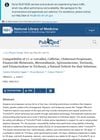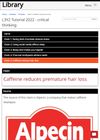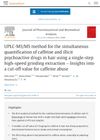 September 2014 in “Hair transplant forum international”
September 2014 in “Hair transplant forum international” Caffeine, niacinamide, and panthenol may improve hair growth, fullness, and healing when applied to the scalp.
 16 citations,
November 2019 in “Nanomedicine”
16 citations,
November 2019 in “Nanomedicine” Thermoresponsive nanogels show promise for delivering medicine through the skin but need more safety testing and regulatory approval before clinical use.
 June 2015 in “Biomedical and biopharmaceutical research”
June 2015 in “Biomedical and biopharmaceutical research” The congress showed advancements in skin hydration, barrier function, and safe, effective new cosmetic formulations.

Topical treatments like minoxidil and corticosteroids are effective for hair loss, with JAK inhibitors promising for alopecia areata.
1 citations,
February 2020 in “PubMed” The topical solution improved hair density and appearance in men with androgenetic alopecia.
 February 2025 in “PubMed”
February 2025 in “PubMed” TrichoSol™ effectively stabilizes various hair treatment ingredients for different durations.
 December 2024 in “http://isrctn.com/”
December 2024 in “http://isrctn.com/” MpowerTM may improve hair growth and satisfaction more than plain minoxidil, with mild side effects.
 32 citations,
December 2017 in “Journal of Drug Delivery Science and Technology”
32 citations,
December 2017 in “Journal of Drug Delivery Science and Technology” Minoxidil and caffeine in transfersomes improve hair growth treatment.
 January 2025 in “International Journal of Molecular Sciences”
January 2025 in “International Journal of Molecular Sciences” Nanoparticles have diverse applications, including promising cancer treatments and hair growth solutions.
 December 2024 in “Skin Appendage Disorders”
December 2024 in “Skin Appendage Disorders” Non-prescription products can help manage androgenic alopecia.
2 citations,
January 2016 Optimized formulations with specific ingredients can significantly improve skin delivery of topical drugs.
 4 citations,
July 2023 in “Pharmaceutics (Basel)”
4 citations,
July 2023 in “Pharmaceutics (Basel)” Nanoparticle-based drug delivery to hair follicles is more effective when tested under conditions that match skin behavior.
 31 citations,
February 2019 in “International Journal of Cosmetic Science”
31 citations,
February 2019 in “International Journal of Cosmetic Science” Caffeine applied to the scalp can protect hair follicles from UV damage.
 April 2019 in “Journal of Investigative Dermatology”
April 2019 in “Journal of Investigative Dermatology” Caffeine can protect scalp hair follicles from damage caused by UV radiation.
 35 citations,
June 2017 in “Pharmaceutical research”
35 citations,
June 2017 in “Pharmaceutical research” Researchers developed a model that shows hair follicles increase skin absorption of caffeine by 20%.
 15 citations,
October 2020 in “European journal of pharmaceutics and biopharmaceutics”
15 citations,
October 2020 in “European journal of pharmaceutics and biopharmaceutics” Caffeine penetrates skin quickly through open hair follicles, but less through closed ones, with levels becoming equal after 22 hours.
 8 citations,
April 2020 in “European Journal of Nutrition”
8 citations,
April 2020 in “European Journal of Nutrition” Newborns' hair shows how much caffeine their mothers drank during pregnancy.

Caffeine can potentially treat common hair loss by counteracting hair follicle shrinkage caused by hormones.
 100 citations,
June 2011 in “Journal of The American Academy of Dermatology”
100 citations,
June 2011 in “Journal of The American Academy of Dermatology” 5% minoxidil foam once daily works as well as 2% minoxidil solution twice daily for female hair growth and is more convenient.

Caffeine in Alpecin shampoo may help prolong hair root activity and reduce hair loss.
 July 2023 in “International journal of research publications”
July 2023 in “International journal of research publications” Green coffee bean extract didn't grow hair but reduced a hair loss-related enzyme in rats.
 6 citations,
January 2020 in “Skin Pharmacology and Physiology”
6 citations,
January 2020 in “Skin Pharmacology and Physiology” HIF-1α stimulators, like deferiprone, work as well as popular hair loss treatments, minoxidil and caffeine, in promoting hair growth.
 5 citations,
November 2021 in “Frontiers in Cell and Developmental Biology”
5 citations,
November 2021 in “Frontiers in Cell and Developmental Biology” Caffeine can damage hearing cells and affect hearing recovery after ear trauma.
 5 citations,
January 2020 in “Journal of Dermatology and Dermatologic Surgery”
5 citations,
January 2020 in “Journal of Dermatology and Dermatologic Surgery” Caffeine may benefit skin and hair health but more research is needed to confirm its effectiveness in dermatology.
 4 citations,
February 2022 in “Journal of Pharmaceutical and Biomedical Analysis”
4 citations,
February 2022 in “Journal of Pharmaceutical and Biomedical Analysis” The conclusion is that a new method can measure caffeine and drugs in hair, finding caffeine abusers have 70 times more caffeine than normal, with a proposed cut-off value for abuse.
 1 citations,
July 2023 in “Cosmetics”
1 citations,
July 2023 in “Cosmetics” The new shampoo effectively delivers caffeine to hair follicles to help keep hair, especially as people age.
 1 citations,
January 2019 in “Advances in Medical Sciences”
1 citations,
January 2019 in “Advances in Medical Sciences” The combination of azelaic acid, minoxidil, and caffeine significantly increased the survival of skin flaps by affecting certain body channels and nitric oxide levels.
 November 2024 in “International Journal of Molecular Sciences”
November 2024 in “International Journal of Molecular Sciences” Nanoparticles may improve caffeine delivery for hair growth, offering a potential alternative to minoxidil for hair loss treatment.
December 2022 in “Clinical and experimental dermatology and therapies” Adding the topical gel improved hair growth more than using minoxidil or finasteride alone.
 August 2023 in “Scientia Pharmaceutica”
August 2023 in “Scientia Pharmaceutica” Color changes in Minoxidil hair products do not affect their effectiveness.



























